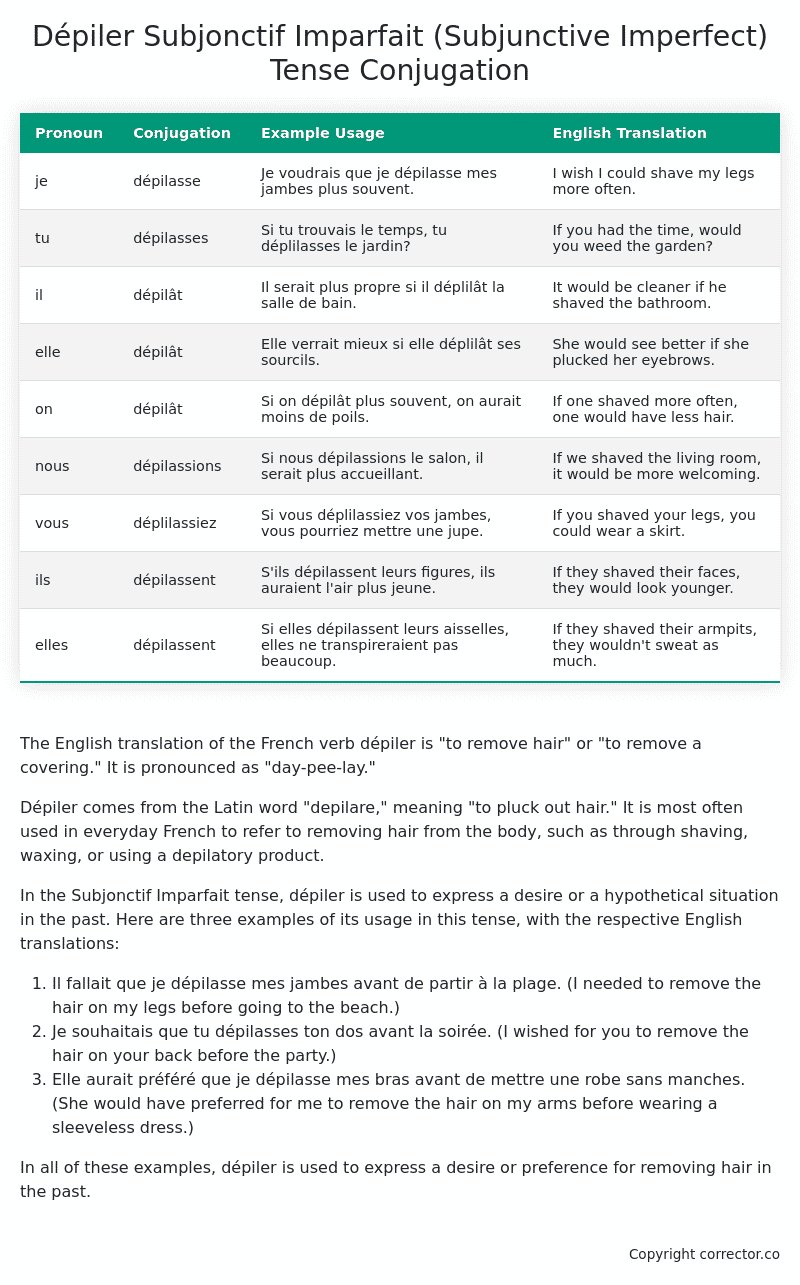Subjonctif Imparfait (Subjunctive Imperfect) Tense Conjugation of the French Verb dépiler
Introduction to the verb dépiler
The English translation of the French verb dépiler is “to remove hair” or “to remove a covering.” It is pronounced as “day-pee-lay.”
Dépiler comes from the Latin word “depilare,” meaning “to pluck out hair.” It is most often used in everyday French to refer to removing hair from the body, such as through shaving, waxing, or using a depilatory product.
In the Subjonctif Imparfait tense, dépiler is used to express a desire or a hypothetical situation in the past. Here are three examples of its usage in this tense, with the respective English translations:
- Il fallait que je dépilasse mes jambes avant de partir à la plage. (I needed to remove the hair on my legs before going to the beach.)
- Je souhaitais que tu dépilasses ton dos avant la soirée. (I wished for you to remove the hair on your back before the party.)
- Elle aurait préféré que je dépilasse mes bras avant de mettre une robe sans manches. (She would have preferred for me to remove the hair on my arms before wearing a sleeveless dress.)
In all of these examples, dépiler is used to express a desire or preference for removing hair in the past.
Table of the Subjonctif Imparfait (Subjunctive Imperfect) Tense Conjugation of dépiler
| Pronoun | Conjugation | Example Usage | English Translation |
|---|---|---|---|
| je | dépilasse | Je voudrais que je dépilasse mes jambes plus souvent. | I wish I could shave my legs more often. |
| tu | dépilasses | Si tu trouvais le temps, tu déplilasses le jardin? | If you had the time, would you weed the garden? |
| il | dépilât | Il serait plus propre si il déplilât la salle de bain. | It would be cleaner if he shaved the bathroom. |
| elle | dépilât | Elle verrait mieux si elle déplilât ses sourcils. | She would see better if she plucked her eyebrows. |
| on | dépilât | Si on dépilât plus souvent, on aurait moins de poils. | If one shaved more often, one would have less hair. |
| nous | dépilassions | Si nous dépilassions le salon, il serait plus accueillant. | If we shaved the living room, it would be more welcoming. |
| vous | déplilassiez | Si vous déplilassiez vos jambes, vous pourriez mettre une jupe. | If you shaved your legs, you could wear a skirt. |
| ils | dépilassent | S’ils dépilassent leurs figures, ils auraient l’air plus jeune. | If they shaved their faces, they would look younger. |
| elles | dépilassent | Si elles dépilassent leurs aisselles, elles ne transpireraient pas beaucoup. | If they shaved their armpits, they wouldn’t sweat as much. |
Other Conjugations for Dépiler.
Le Present (Present Tense) Conjugation of the French Verb dépiler
Imparfait (Imperfect) Tense Conjugation of the French Verb dépiler
Passé Simple (Simple Past) Tense Conjugation of the French Verb dépiler
Passé Composé (Present Perfect) Tense Conjugation of the French Verb dépiler
Futur Simple (Simple Future) Tense Conjugation of the French Verb dépiler
Futur Proche (Near Future) Tense Conjugation of the French Verb dépiler
Plus-que-parfait (Pluperfect) Tense Conjugation of the French Verb dépiler
Passé Antérieur (Past Anterior) Tense Conjugation of the French Verb dépiler
Futur Antérieur (Future Anterior) Tense Conjugation of the French Verb dépiler
Subjonctif Présent (Subjunctive Present) Tense Conjugation of the French Verb dépiler
Subjonctif Passé (Subjunctive Past) Tense Conjugation of the French Verb dépiler
Subjonctif Imparfait (Subjunctive Imperfect) Tense Conjugation of the French Verb dépiler (this article)
Subjonctif Plus-que-parfait (Subjunctive Pluperfect) Tense Conjugation of the French Verb dépiler
Conditionnel Présent (Conditional Present) Tense Conjugation of the French Verb dépiler
Conditionnel Passé (Conditional Past) Tense Conjugation of the French Verb dépiler
L’impératif Présent (Imperative Present) Tense Conjugation of the French Verb dépiler
L’infinitif Présent (Infinitive Present) Tense Conjugation of the French Verb dépiler
Struggling with French verbs or the language in general? Why not use our free French Grammar Checker – no registration required!
Get a FREE Download Study Sheet of this Conjugation 🔥
Simply right click the image below, click “save image” and get your free reference for the dépiler Subjonctif Imparfait tense conjugation!

Dépiler – About the French Subjonctif Imparfait (Subjunctive Imperfect) Tense
Formation
Common Everyday Usage Patterns
Interactions with Other Tenses
Subjonctif Présent
Indicatif Passé Composé
Conditional
Conditional Perfect
Summary
I hope you enjoyed this article on the verb dépiler. Still in a learning mood? Check out another TOTALLY random French verb conjugation!


